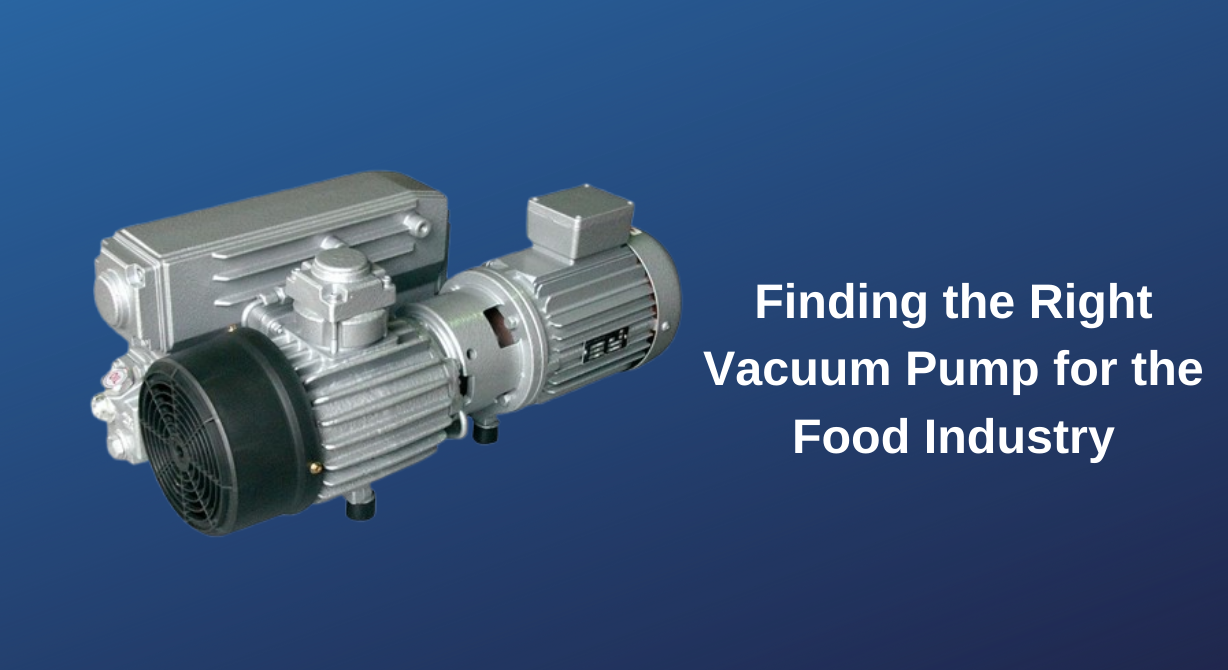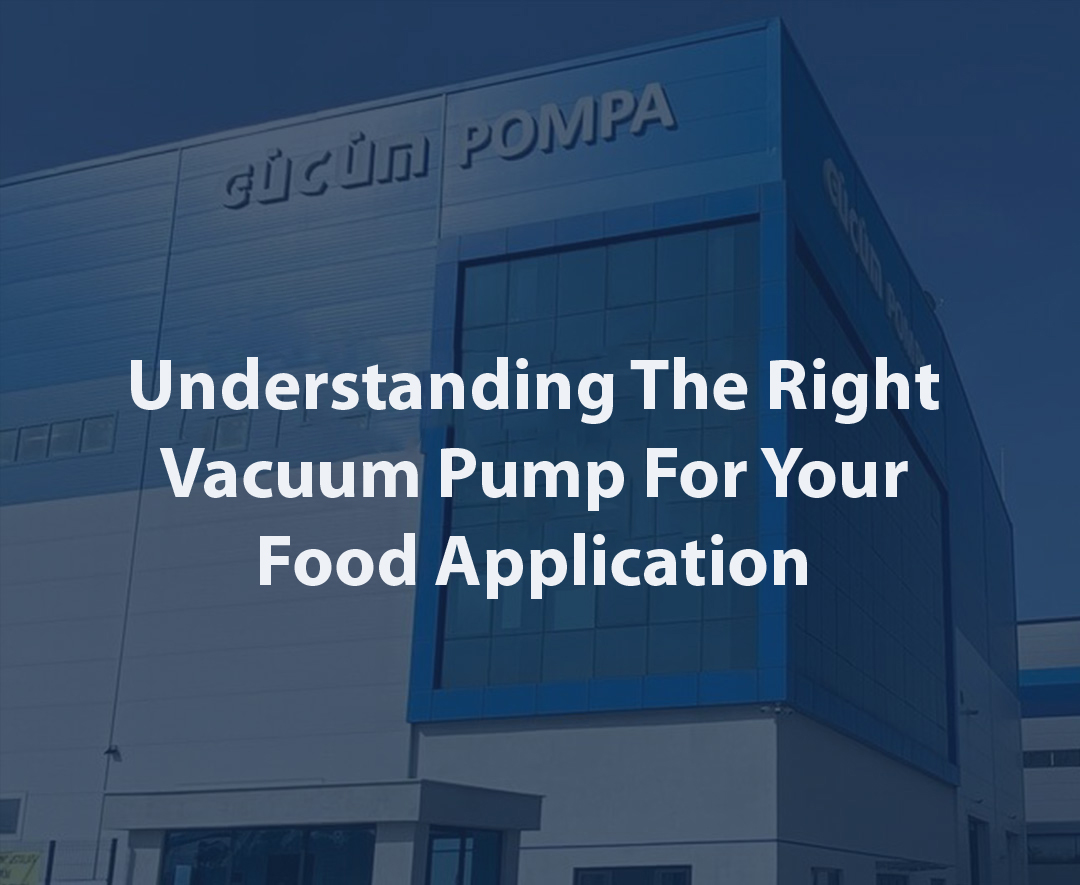Understanding The Right Vacuum Pump For Your Food Application
In Which Applications Are Vacuum Pumps Used In The Food Industry?
The food industry is a complex industry that includes many critical processes such as processing, packaging, storage and preservation of products. Vacuum pumps play a vital role in these processes and are used in many different applications. Vacuum pumps are specially designed for the food industry, providing safety, hygiene and efficiency.
Vacuum pumps offer food manufacturers the possibility of vacuum packaging. This practice significantly increases the freshness and shelf life of food products. Vacuum pumps reduce the amount of oxygen in the package by absorbing the air in the product to be packaged. In this way, the reproduction and oxidation processes of microorganisms are prevented. Various food products such as meat products, seafood, cheese, coffee, dried fruits and vegetables preserve their freshness for a long time thanks to vacuum packaging.
In addition, vacuum pumps also play an important role in vacuum preservation applications in the food industry. When food products are stored under vacuum, loss of moisture, aroma and nutritional value is minimized. In particular, coffee beans retain their fresh aroma for longer when freshly ground.
In the food processing process, vacuum pumps are used for processes such as vacuum cooling and dehydration. Cooling under vacuum ensures rapid cooling of food products and prevents bacterial growth. The dehydration process, on the other hand, reduces the water content of fruits and vegetables, allowing them to last longer.
Vacuum pumps also play an important role in aroma and flavor preservation in food production. Processing under vacuum ensures that the natural aroma and flavor of food products are preserved.
In the food industry, vacuum pumps play a vital role in many important applications such as packaging, vacuum preservation, refrigeration, dehydration and aroma preservation. Vacuum pumps are an indispensable part of the food industry with their designs that comply with hygiene standards and their features that meet food safety requirements.

Which Type Of Vacuum Pump Provides The Best Results In Food Processing And Packaging Processes?
In the food industry, vacuum pumps play an important role in processing and packaging processes. But which type of vacuum pump provides the best results is an important question for professionals in the industry. Here are the types of vacuum pumps that provide the best results in food processing and packaging processes:
Rotary Vacuum Pumps: Rotary vacuum pumps are a widely preferred option in the food industry. They are known for their ability to reach high vacuum levels, their ability to provide fast vacuum and their low maintenance requirements. There are also models designed in accordance with hygienic standards.
Claw Vacuum Pumps: Claw vacuum pumps are an option in the food industry providing efficiency and reliability. They are preferred due to their low energy consumption, low noise levels and hygienic features. They can also create fast vacuum with high flow rate.
Screw Vacuum Pumps: Screw vacuum pumps have a wide range of applications in the food industry. They are known for their high efficiency, low energy consumption and long-lasting performance. It also has hygienic designs that reduce the risk of contamination and prevent bacterial growth.
Diaphragm Vacuum Pumps: Diaphragm vacuum pumps are used in applications requiring precise vacuum control in food processing and packaging processes. They stand out with their reliable performance, low maintenance and hygienic structures. At the same time, its oil-free operation minimizes contact with food products.
Reciprocating Vacuum Pumps: Reciprocating vacuum pumps are the preferred option in small scale food processing and packaging processes. They are known for their simple construction, low cost and ease of use. Models that meet hygienic requirements are available.
The type of vacuum pump that provides the best results in food processing and packaging processes can vary depending on application needs. The advantages and features of each type of vacuum pump must be considered to meet the specific requirements of users. It is important to get professional advice and choose a vacuum pump that suits the needs.
What Is The Role Of Vacuum Pumps In Vacuum Preservation And Shelf Life Extension Of Food Products?
In the food industry, it is of great importance to preserve the freshness of products and extend their shelf life. At this point, vacuum pumps play a vital role in vacuum preservation and shelf life extension of food products. Vacuum pumps are reliable devices with features designed in accordance with hygiene standards in the food industry and meeting food safety requirements.
The most important task of vacuum pumps is to reduce the amount of oxygen in food products. Oxygen can cause food spoilage and the growth of microorganisms. Vacuum pumps reduce the amount of oxygen by absorbing the air inside the packaging during the packaging of food products. This inhibits the growth of microorganisms and the occurrence of oxidation processes. As a result, the freshness of food products is preserved and the shelf life is extended.
Vacuum preservation is widely used in a variety of food products, especially meat products, seafood, cheese, coffee, dried fruit and vegetables. Vacuum packaging preserves the natural freshness, aroma and nutritional value of the products. In addition, it prevents the products from being affected by external factors and minimizes nutrient loss.
Vacuum pumps also work quickly and effectively in the vacuum packaging process. Food products are hygienically packed with vacuum packaging and are safely protected while reaching the consumer. Vacuum pumps optimize these processes with their powerful suction and fast vacuum delivery capabilities.
The role of vacuum pumps in the food industry is vital in keeping products fresh, extending shelf life and optimizing hygienic packaging processes. Vacuum pumps are an indispensable tool in the food industry, providing reliability and efficiency.
How Do Vacuum Pumps Increase Efficiency In Food Processing Processes?
In the food industry, vacuum pumps play a critical role in preserving the aroma, flavor and nutritional value of food products. Vacuum pumps are used in vacuum packaging and processing processes to maintain the freshness and quality characteristics of food products.
Vacuum packaging process reduces the contact of food products with oxygen. Oxygen can cause food spoilage and loss of nutritional value. Vacuum pumps reduce the amount of oxygen in the packaging by absorbing air during the packaging process. This prevents food products from being affected by oxidation processes and maintains their freshness. Thus, the natural aroma and flavor characteristics of the products are preserved.
In addition, vacuum pumps extract air and gases from food products. This means products are jammed and packed tightly. Tight packaging prevents the products from being exposed to external factors and ensures the preservation of aroma and flavor.
Vacuum pumps also help preserve the nutritional value of food products. By reducing the effect of oxygen, it prevents oxidation processes and minimizes the loss of nutritional value. Vitamins, minerals and other nutritional components are better preserved in a vacuum environment and remain healthy for longer.
However, vacuum pumps also stand out with their hygienic design. Vacuum pumps used in the food industry are designed in accordance with food safety standards. Their hygienic structures and easy-to-clean features minimize the risk of contamination of products and ensure food safety.
As a result, vacuum pumps play an important role in preserving the aroma, flavor and nutritional value of food products. These pumps, which are used in vacuum packaging and processing processes, prevent oxidation processes, preserve their nutritional value and preserve the natural properties of food products. This provides consumers with the opportunity to offer quality and nutritious food products.
How To Choose Vacuum Pump Manufacturers That Comply With Food Safety Standards?
Quality Certificates and Certificates: A reliable vacuum pump manufacturer should have documents and certificates proving the quality of their products. ISO 9001:2015 quality management system certification indicates that the manufacturer complies with quality standards.
Hygienic Design: Vacuum pumps used in the food industry should have a hygienic design. The manufacturer must ensure that the products are made of materials that are easily cleanable, do not rust and meet food safety requirements.
Experience and Expertise: It is important to choose a vacuum pump manufacturer with many years of experience in the food industry. An experienced manufacturer understands industry-specific needs and offers the most suitable solutions.
Customer References: References point to customer satisfaction and reliability of a manufacturer. By requesting customer references from the relevant manufacturer, you can evaluate the manufacturer's relationship with previous customers.
Technical Support and After-Sales Services: A vacuum pump manufacturer should provide technical support and after-sales services after the purchase process. It is important to have a reliable support network for maintenance, repair and spare parts supply.
R&D Activities: Innovation and continuous improvement are the basis for the success of a vacuum pump manufacturer. A manufacturer that invests in R&D activities and innovative solutions would be the appropriate choice to meet the needs of the evolving food industry.
Industry Standard Compliance: A vacuum pump manufacturer must comply with food safety standards and industry requirements. Manufacturers that comply with standards such as FDA, EHEDG and CE are assured of providing reliable and quality products.
Testing and Verification Processes: The manufacturer puts its products through quality control tests and verifies their performance. Asking the manufacturer about the testing and verification processes of the products will ensure that the products are of high quality.
